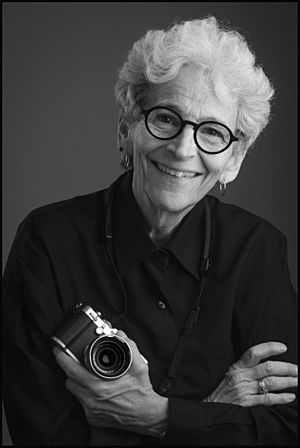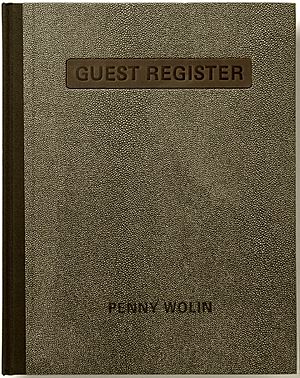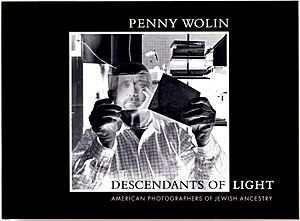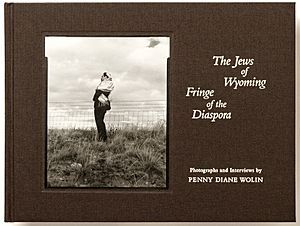Penny Wolin facts for kids
Penny Wolin (born June 5, 1953) is an American portrait photographer and a visual anthropologist. This means she uses photography to study people and their cultures. Her work has been shown in solo exhibitions at the Smithsonian Institution. She has also received important grants from the National Endowment for the Humanities and the National Endowment for the Arts. Her photographs are kept in major collections, including those at Harvard University and the Smithsonian American Art Museum. Penny Wolin is known for her documentary and conceptual photos. She has worked for big companies, magazines like LIFE Magazine, and private collectors. For over 30 years, she has used photos and interviews to learn about Jewish life in America.
Contents
Early Life and Education
Penny Wolin is the youngest of five children. She grew up in a Jewish family in Cheyenne, Wyoming. Her father, Morris Aaron Wolin, came from Grodno, Russia, as a child and became a businessman. Her mother, Helen Sobol Wolin, was an artist from Denver, Colorado.
Penny started taking pictures at age 10 with a Kodak Brownie Hawkeye camera. When she was 16, her brother Michael gave her a better camera and darkroom equipment. This helped her start her photography career.
She studied at the University of Wyoming and then graduated from Art Center College of Design in Pasadena, California. There, she focused on photography and film. Later, she joined a master's program at the University of California, Los Angeles. She studied cultural anthropology with Johannes Wilbert. She also received a special fellowship to direct films at the American Film Institute.
Photography Projects
Guest Register: Hotel Life in Hollywood
In 1975, when Penny Wolin was 21, she moved into the St. Francis Hotel in Hollywood, California. This hotel was for people who rented single rooms. She photographed and interviewed many of the people living there. She created 34 black and white photos with parts of their stories for her project called Guest Register.
The St. Francis Hotel was on Hollywood Boulevard. It was home to all kinds of people, from those staying one night to those who had lived there for 30 years. This project helped Penny Wolin get noticed by famous graphic designers. They hired her to photograph well-known people like Ansel Adams and George Burns. Her work was also shown in a group exhibition at the Los Angeles County Museum of Art.
Descendants of Light: Jewish Photographers in America
In 2005, Penny Wolin began a project called Descendants of Light: American Photographers of Jewish Ancestry. She wanted to explore how Jewish photographers have shaped photography in America since the 1850s. This includes photography in news, fashion, portraits, advertising, and fine art.
For this project, she photographed and interviewed many photographers. If a photographer had passed away, she interviewed their families. She also re-photographed old family pictures and showed one famous photo by each artist. This helped her tell a multi-generational story. It showed how American Jewish culture, modern America, and the history of photography are connected. Some famous Jewish-American photographers she featured include Annie Leibovitz, Robert Frank, and Helen Levitt.
The Jews of Wyoming: A Unique Community
In 1982, Penny Wolin met Shirley Burden, who helped fund the photography department at The Museum of Modern Art. With his help and two grants from the National Endowment for the Humanities, Wolin completed a big study. She spent 15 years documenting 140 years of Jewish culture in Wyoming.
Her project, The Jews of Wyoming: Fringe of The Diaspora, explored five generations of Jewish life there. It was supported by the Skirball Cultural Center in Los Angeles, California. Her work was shown in solo exhibitions at the Smithsonian Institution, the National Museum of American History, and other museums. A book with the same title was also published.
Jackalopes, Cowboys and Coalmines: Wyoming's Changing Landscape
In 1978, Penny Wolin received a grant from the National Endowment for the Arts. This allowed her to complete Jackalopes, Cowboys and Coalmines: A Photographic Survey of Wyoming. Wyoming has many natural resources like minerals and oil. This meant its economy often went through "boom or bust" periods.
During a national energy crisis, Wyoming experienced a huge energy boom. This brought big changes to the state's small, rural towns. Shopping malls and fast-food restaurants appeared. Local businesses closed, and the traditional ranching economy struggled. Working in an open-pit coal mine or on a drilling rig paid much more than tending cattle.
Penny Wolin traveled through Wyoming in every season. She photographed and interviewed both long-time residents and new arrivals. Her subjects included cowboys, oilfield roughnecks, and elected officials. The photos and stories became a traveling exhibition. They are now part of the permanent collection at the Wyoming State Museum and the Smithsonian American Art Museum.
Selected Exhibitions
| Year | Location | Title | Solo/Group |
|---|---|---|---|
| 2025 | Leica Gallery, New York, New York | GUEST REGISTER | Solo |
| 2018 | Museum of Sonoma County, Santa Rosa, California | Aftermath: The Tubbs Fire | Group |
| 2017 | Calabi Gallery: Santa Rosa, California | Aftermath: The Tubbs Fire | Group |
| 2012 | Calabi Gallery: Santa Rosa, California | Descendants of Light: American Photographers of Jewish Ancestry | Solo |
| 2011 | New York Public Library, New York, New York | Recollection: Thirty Years of Photography | Group |
| 2000 | The Osher Marin Gallery: San Rafael, California | The Jews of Wyoming: Fringe of the Diaspora | Solo |
| 1995 | Eiteljorg Museum, Indianapolis, Indianapolis | Jackalopes, Cowboys and Coalmines: Energy Development and the Culture of the Cowboy | Group |
| 1994 | National Museum of American Jewish History, Philadelphia, Pennsylvania | The Jews of Wyoming: Fringe of the Diaspora | Solo |
| 1992 | Smithsonian Institution, National Museum of American History, Washington, DC | The Jews of Wyoming: Fringe of the Diaspora | Solo |
| 1992 | Judah L. Magnes Museum, Berkeley, CA, | The Jews of Wyoming: Fringe of the Diaspora | Solo |
| 1990 | Skirball Cultural Center, Los Angeles, California | The Jews of Wyoming: Fringe of the Diaspora | Solo |
| 1990 | Wyoming State Museum, Cheyenne, Wyoming | The Jews of Wyoming: Fringe of the Diaspora | Solo |
| 1984 | Ucross Foundation, Ucross, Wyoming | Jackalopes, Cowboys and Coalmines: Energy Development and the Culture of the Cowboy | Solo |
| 1980 | Wyoming State Museum, Cheyenne, Wyoming | Jackalopes, Cowboys and Coalmines: Energy Development and the Culture of the Cowboy | Solo |
| 1980 | The Nicolaysen Art Museum: Casper, Wyoming | Jackalopes, Cowboys and Coalmines: Energy Development and the Culture of the Cowboy | Solo |
Selected Photography Assignments
Penny Wolin has worked on many interesting projects for different clients:
- Roman Vishniac Estate: Helping to restore and print photos by the famous photographer Roman Vishniac.
- Life magazine: Taking portraits for the "American Dreamer" column, including one of author Ursula K. Le Guin.
- Wet magazine: Creating a cover photo of Teri Garr and other pictures.
- Discover magazine: Photographing scientist John Henry Schwarz.
- Conde Nast Traveler: Taking photos for an article about international travel.
- Rolling Stone magazine: Photographing music groups like The Band and actors like James Caan.
- Esquire magazine: Taking a portrait of architect Jon Jerde.
- Forbes magazine: Photographing business leaders like David Geffen and Eric Schmidt.
- Sonoma Valley Film Festival: Helping to direct programs about films.
- Wolfgang Puck Food Company: Photographing restaurant interiors.
- Charles Schulz Museum: Taking pictures of art installations.
- Various Wineries: Photographing for places like Peter Michael Winery and Kendall-Jackson Winery.
- Cedars-Sinai Medical Center: Creating covers and photos for their publications.
Teaching Experience
Penny Wolin has also shared her knowledge by teaching photography and visual literacy:
| Year | Position | Institution | Course |
|---|---|---|---|
| 2020–Present | Adjunct Professor | ArtCenter College of Design; Pasadena, California | MFA Program; Visual Literacy Through the Lens |
| 2019–Present | Adjunct Professor | ArtCenter College of Design; Pasadena, California | Photography for Graphic Designers |
| 2019–2022 | Artist in Residence | Meaningful Works Consultancy; Los Angeles, California | Lens Based Visual Literacy; Analysis of Word, Image and Light |
| 2000 | Program Director | Sonoma Valley Film Festival; Sonoma, California | Art, Passion and Politics |
| 1999 | Program Director | Sonoma Valley Film Festival; Sonoma, California | Films by or about Women |
| 1998 | Instructor | Academy of Art University; San Francisco, California | Documentary Portraiture |
| 1996 | Instructor | Art Center College of Design; Pasadena, California | History of Photography |
| 1995 | Instructor | Sonoma State University; Cotati, California | Film Production |
| 1990 | Instructor | Art Center College of Design; Pasadena, California | Documentary Portraiture |
| 1986 | Instructor | Art Center College of Design; Pasadena, California | Portraiture |
| 1985 | Instructor | California Institute of the Arts; Valencia, California | Photography for Graphic Designers |
| 1982 | Instructor | University of Idaho; Moscow, Idaho | Documentary Photography |
| 1970 | Instructor | 4-H; Cheyenne,Wyoming | Kids and Cameras |
What People Say About Her Work
Penny Wolin's work has received praise from many publications.
- The New York Times Book Review called her book Guest Register "remarkable" for its gentle spirit. It showed how the people in the St. Francis Hotel were "radiant, beautiful, timelessly alive."
- The Los Angeles Times described her Guest Register photos as "intimate portraits" that captured a past Hollywood era.
- Kirkus Reviews said Descendants of Light was a "rich, well-documented collection" for those interested in photography and Jewish culture.
- The Wall Street Journal noted that Penny Wolin asked Jewish photographers why they were drawn to photography for her book Descendants of Light.
- The Washington Post praised her exhibition The Jews of Wyoming. They said her photos and interviews were "poignant and sometimes so surprising."
- American Photographer magazine described her as a "methodical, quiet professional." They noted she is good at focusing on her subjects without letting her own ego get in the way.





